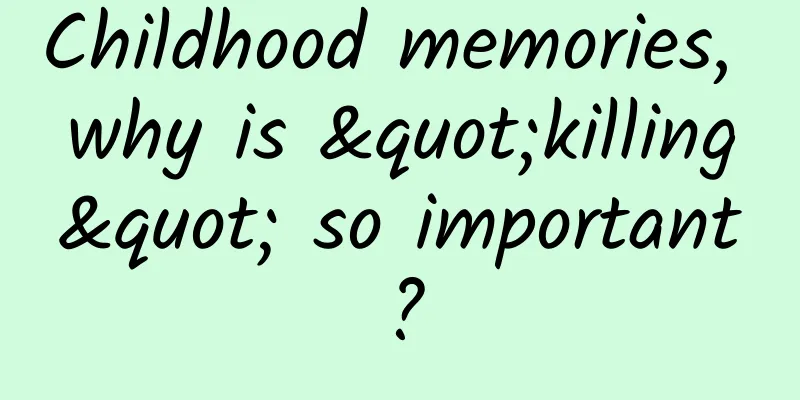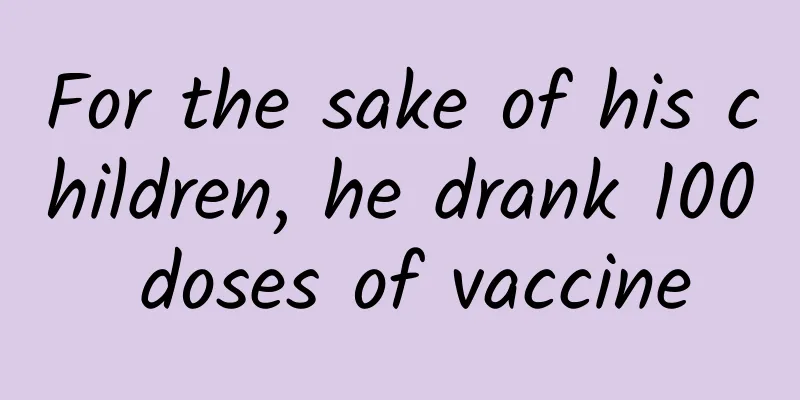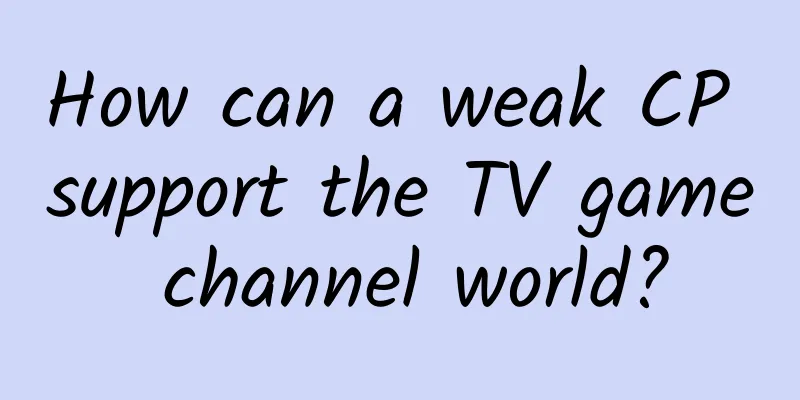Childhood memories, why is "killing" so important?

|
Not long after Children's Day, the mid-year promotion 618 is here again! A large number of activities and shopping under the banner of "My Youth is Back" made friends shout in unison "Childhood memories are killing me!" In today's increasingly fast-paced life, why do we want to "go back to the past"? In this process, what hits our "soft spot" and makes us involuntarily offer our tears and wallets? Image source: soogif 1. The mechanism of “memory killing” When it comes to memories, there is a word that is closely related to it, and we often use it without clearly distinguishing it from memories, that is - memory. From the perspective of connotation and research history, recollection is a topic discussed in consciousness psychology. It is a conscious activity that recalls and reproduces things experienced in the past. In Ebbinghaus's On Memory, he defined recollection as a reconstruction with past consciousness and situational consciousness. The reconstruction of recollection is richer than the reconstruction of memory. Memory is a topic discussed in functional psychology. It is not a conscious activity, but a psychological function that preserves things experienced in the past so that they can be recalled to the present in the future. In subsequent studies, researchers gradually realized that memory is the physiological basis of recollection and is manifested through recollection activities. Image source: contracted photographer/IC photo Therefore, "memories" are aimed at groups that have experienced the same period and era, and they share "memories" about the culture and emotions of this period. Smart businesses create conditions for the emergence of elements that evoke memories, inadvertently pulling the audience back to the past, thereby stimulating consumption. Especially when the number of audiences is large, "memories" strengthens the psychological connection and emotional resonance between the audiences, and has a wider impact. People are willing to pay not only for this element, but also for its many derivatives. 2. The role and significance of memories Depending on whether the recollection has a predetermined purpose and task, recollection can be divided into intentional recollection and unintentional recollection. The former is a guide for recall tasks, the purpose of which is to recall specific memory content as needed, which requires a certain amount of willpower and can be controlled. The latter is a guide without a predetermined purpose, which is people's natural and spontaneous recollection of certain experiences. No matter which kind of memory, through reasonable use, it will have a positive meaning in our lives. Image source: Paixin Creative First, memories can bring us closer to new things. Memories reflect past, established facts, and confirm the reality of past emotions, behaviors, and cognitions. When we need to use memories to understand new things and learn new content, the existence of such established facts can provide some positive help and reduce learning costs. Therefore, when faced with a new task, if one can find the connection between it and past experience and make the experience coherent, it can speed up learning and improve efficiency to a certain extent. Image source: Paixin Creative Second, memories strengthen the sense of community. French sociologist Maurice Halbwachs proposed the concept of "collective memory", and Jan Assmann, Paul Connaton and others have also conducted corresponding research on it. When we are in society, everyone has various connections with others, so society can continue and be maintained. Even if people in the same period or the same group have never met, reproducing corresponding materials through various media forms can trigger empathy and belonging in the subconscious, naturally forming a community, and thus producing a scale effect. Therefore, in interpersonal communication, we can appropriately use common memories to quickly narrow the distance between people. Image source: Paixin Creative Third, reminiscence is also a healing process. After conducting a controlled experiment, Professor Clay Roderich of North Dakota State University and his team found that appropriate "nostalgia" can improve people's mood, relieve loneliness, boredom and anxiety, and make people feel warmer and more willing to pass on warmth to others. The researchers summarized this as the "warmth effect." Therefore, proper recollection can make individuals more optimistic and confident, make people more "human", and can also help them adapt to the environment and heal the regrets and losses of the past. 3. Treat “memories” scientifically In addition to games, when people are faced with various forms of "memory recall" such as animation, film and television dramas, some people become staunch supporters of memories and think that everything in the past is good, while some people think that memories are worthless. So how should we treat memories scientifically? Source: Taken by myself First of all, we must learn to distinguish the authenticity of memories. Sometimes we are very sure about things that clearly did not happen, and we can retrieve them from our memory. This phenomenon is called "false memory". The information in the brain's memory will be automatically combined and reconstructed under the influence of factors such as social environment and inductive questions, making us believe that the memories stored in our minds are completely true and accurate, but in fact they are not. We will selectively pick out the pleasant parts and magnify them while ignoring the negative contents to beautify the memories. Especially when we repeatedly emphasize a certain type of emotion or situation in the memories, it will increase the possibility of false memories. Therefore, when we talk about memories, we need to be as cautious as possible and think about its significance to the present, and not make blind comparisons. Image source: Paixin Creative Secondly, avoid being overly addicted to or completely avoiding memories. Researchers have found that people who are long-term obsessed with nostalgia may escape reality because of excessive indulgence. People who completely avoid memories may have lower self-resilience and self-esteem, which cannot help individuals perceive the meaning of life and cope with the threat of death. Therefore, we need to maintain an appropriate frequency of recollection, balance memories with reality, avoid excessive self-consumption in memories, focus on the "present" life and the value of "me", properly use memories as experience to guide current behavior, not focus too much on the past, and not completely detach from existence. Image source: Paixin Creative Our youth will not end because of game delisting, idol marriage, or fashion elimination, nor will it return to the past because of animation renovation, game reset, or old song re-singing. While paying for memories and pulling out tissues to wipe away tears for the past, we should also grasp the acceptable level and let memories become the fuel that helps us move forward. Author: Flying Pig, PhD in Education. Audit expert: Huang He Source: Chongqing Science and Technology Museum Statement: Except for original content and special notes, some pictures are from the Internet. They are not for commercial purposes and are only used as popular science materials. The copyright belongs to the original authors. If there is any infringement, please contact us to delete them. |
<<: Are purebred cats more likely to get heart disease? Parents of furry children must read this!
Recommend
Swift Tip: Use build configurations to support conditional compilation
In Objective-C, we often use preprocessor directi...
Android version split, where should developers go?
Recently, Google released a distribution chart of...
Nanjing suspends on-site tomb sweeping during the 2020 Qingming Festival! What should we do if on-site tomb sweeping is suspended? You can pay respects to the deceased in this way!
As the Qingming Festival is approaching, many fri...
Why buy an iPhone 11 for the same price? After trying out the vivo NEX3, I realized that this is the phone of the future.
The mobile phone market is becoming increasingly ...
An important discovery: TRAPPIST-1 habitable planet orbit is not misplaced!
[Mobile software: Bo Ke Yuan] Astronomers using t...
CBRE: 2020 Shanghai Office Tenant Census
Data source: CBRE Research, Q3 2020 Financial Ind...
Real-life and analysis of community operations
The concept of community operation is very popula...
Birds are experts in eating spicy food! Why are they not afraid of spicy food?
There are many interesting phenomena hidden in th...
Setting up the environment for decompiling Android apps on Mac OS
[[144520]] Often, for the purpose of learning or ...
Even if you are given a chance to copy, you can’t copy other people’s popular H5. Why?
Typically, a hit H5 has three elements: I. Elemen...
Summary of AndroidStudio shortcut keys
Ctrl+G / Ctrl+Alt+Shift+G: Query where a variable...
Taking stock of the next generation of virtual reality controllers
Virtual reality is already available in many plac...
Electric Technology Car News: Highlander has long been unable to satisfy the thirsty car buyers. Who will be the next SUV overlord among Trumpchi, Changan and Haval?
With the rapid rise of domestic auto brands, more...
Mobile game developer apologizes after pornographic video of player posted online
Yesterday, the built-in game "Crazy Laiwang&...
How much is the price for being an agent of Jiamusi catering kitchen app? Jiamusi Kitchen Mini Program Agent Price Inquiry
Is it easy to be an agent of Jiamusi Restaurant K...









